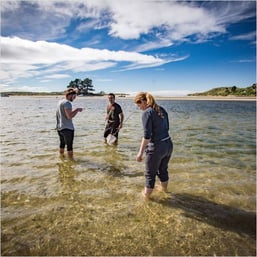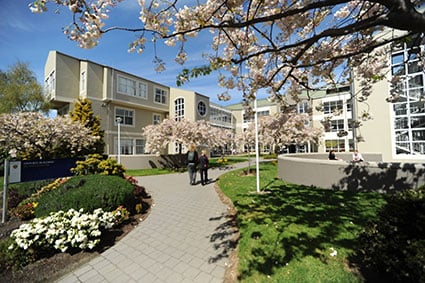I didn’t truly address the question of what I wanted to do when I grew up until I was all but finished my undergraduate degree (and I hope I’m not alone in this sentiment). Entering the final semester of a neuroscience major, I was struck with the realisation that I didn’t want a career in neuroscience—whatever that entails. Despite being engrossed by the theory and findings of brain science, my curiosity did not ultimately translate to a desire to do the research itself. Several years of exclusively writing lab reports and empirical essays had also stirred some of my more creative faculties into motion, such that a desire to once again write for fun eventually saw an English minor tacked onto my BSc. With this decision I had unwittingly begun my journey towards a career in science communication, an established field of inquiry with which I was not yet familiar. The idea that my piecemeal degree might one day foster a meaningful day job only came into focus when an English tutor noted my eclectic mix of science and arts papers: “There’s a department at the university I think you should check out.”
 |
| A scicomm group project on the Leith river. Photo courtesy of Leonardo Ramos. |
I enrolled into a summer school course at the University of Otago’s Department of Science Communication the following year and, having thoroughly enjoyed a taste of what was to offer, continued straight on to a master's degree in science communication. The first year of the course involved a whirlwind of skill acquisition. Classes covered filmmaking, podcasting, philosophy of science, creative writing, designing and curating exhibitions, animation, graphic design, and more. I recall a particularly busy point of the first semester in which I had several projects nearing deadline (an animated video depicting nuclear fission; a podcast with a genetics researcher on parasitoid wasps; and an essay on the life of Srinivasa Ramanujan, to be precise) and remarking to a classmate that, if this was one day required of me for work, I would have a high level of career satisfaction indeed.
For many venturing forth from tertiary study, the myriad trajectories ahead can be condensed into two discernible paths. The first leads into the world of industry. Along this road, science communication graduates are often well-equipped. Many institutions are sincerely interested in connecting with the public in a meaningful way, and not solely to ensure a profit. Often, these companies believe they possess something that will truly benefit others. Herein, a good science communicator—with an understanding of how to appeal to a given audience and how to utilize a wide array of media in doing so—can prove invaluable in the pursuit of public engagement.
Studying science communication is an equally fruitful endeavor for those embarking on the route towards academia. Many of those entering science communication (myself included) come from a scientific background and bring with them established interests and areas of expertise. Perhaps the strongest aspect of science communication, then, is its sheer versatility in the face of disparate spheres of research. In my case, an interest in neuroscience was carried over and allowed to percolate within a new intellectual environment. Over time, this interest came to incorporate other facets which occupied my attention, until these coalesced into a research topic on concussion in sport and the public’s perception of head injury risk.
In completing a master’s thesis in science communication, I had the chance to carry out a comprehensive review of the literature informing the notion of “heading” in soccer as a possible neurological health risk. Having played the sport my entire life, I was curious as to what the research had to say. Moreover, this subject allowed me to engage in findings relevant to my background (neuroimaging, biomechanics, neuropsychology) and from areas in which I knew very little. Diving into subjects like risk perception, scientific uncertainty and precautionary regulation was all necessary to inform the experimental aspect of my thesis: a survey instrument designed to measure how individuals respond to issues of unsettled science. Understanding just how the public utilizes insights gleaned from scientific research is, after all, one of the enduring goals of science communication.
 |
| The Owheo building, home of the University of Otago's Science Communication Department |
The power of science to improve the world around us has long been known; ensuring all have access to this power and the tools to deploy its wisdom remains a challenge. Departments like ours reflect a growing effort to address this obstacle in its many forms. A short stroll from my office to the tearoom would often illustrate the breadth of knowledge and passion on display in our building, each day brushing past and chatting with individuals whose research ranged from wildlife conservation to abortion law to poetry.
A research discipline in its own right, science communication reflects a necessary confluence of science and the world it hopes to change. Most researchers are aware of the importance of science communication, although the detritus of misinformation in the wake of a global pandemic can make for a sore reminder of how far we have yet to go. In a world where information becomes easier to access by the day, it has never been more crucial to understand just how we receive, process and respond to that information.
 Alex Gilbert is a PhD student at the University of Otago. Studying in the same Department of Science Communication where he completed a master's degree in 2020, his research explores risk-taking behavior among collision sport athletes, as well as the ethical and health policy implications arising from sport-related concussion.
Alex Gilbert is a PhD student at the University of Otago. Studying in the same Department of Science Communication where he completed a master's degree in 2020, his research explores risk-taking behavior among collision sport athletes, as well as the ethical and health policy implications arising from sport-related concussion.
More resources on the Addgene blog
Summer SciComm Series: Cognitive Load
Summer SciComm Series: Modes of Communication
Intro to Our Summer SciComm Series!
Topics: Science Careers, Science Communication





Leave a Comment